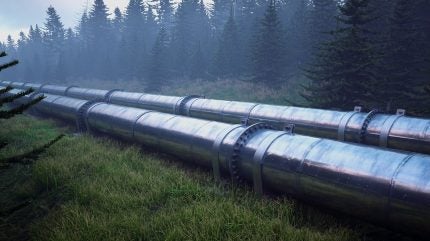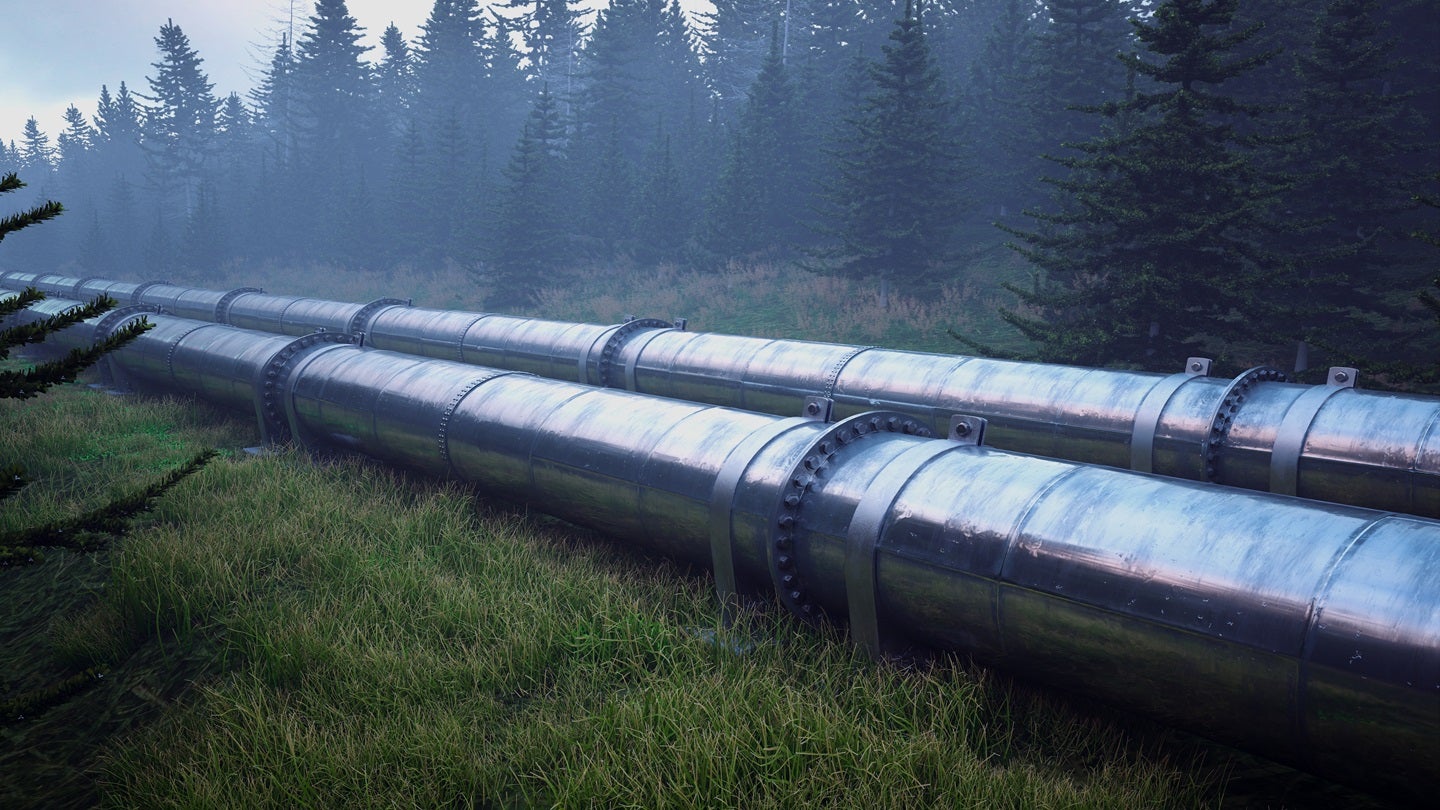
TC Energy’s Energy East pipeline and the GNL Quebec LNG project were previously rejected. Credit: Dabarti CGI/Shutterstock.
Canadian province Quebec is open to revisiting previously rejected liquefied natural gas (LNG) and oil projects, influenced by US President Trump’s policies.
Quebec Environment Minister Benoit Charette indicated a willingness to reconsider the Energy East pipeline and GNL Quebec project if concerns are addressed, reported Bloomberg.
Quebec has historically resisted new oil and gas pipelines. However, recent statements from Charette suggest a potential shift in this stance.
TC Energy‘s Energy East pipeline and the GNL Quebec LNG project, which involves an LNG pipeline and an export terminal in the Saguenay region, were previously rejected citing environmental concerns.
South Bow, a company spun out of TC Energy, declined to comment on the Energy East project. TC Energy did not respond to requests for comment.
Charette said: “If we address these concerns today, these are projects that could be accepted.”
Access the most comprehensive Company Profiles
on the market, powered by GlobalData. Save hours of research. Gain competitive edge.

Company Profile – free
sample
Your download email will arrive shortly
We are confident about the
unique
quality of our Company Profiles. However, we want you to make the most
beneficial
decision for your business, so we offer a free sample that you can download by
submitting the below form
By GlobalData
Country *
UK
USA
Afghanistan
Åland Islands
Albania
Algeria
American Samoa
Andorra
Angola
Anguilla
Antarctica
Antigua and Barbuda
Argentina
Armenia
Aruba
Australia
Austria
Azerbaijan
Bahamas
Bahrain
Bangladesh
Barbados
Belarus
Belgium
Belize
Benin
Bermuda
Bhutan
Bolivia
Bonaire, Sint
Eustatius
and
Saba
Bosnia and Herzegovina
Botswana
Bouvet Island
Brazil
British Indian Ocean
Territory
Brunei Darussalam
Bulgaria
Burkina Faso
Burundi
Cambodia
Cameroon
Canada
Cape Verde
Cayman Islands
Central African Republic
Chad
Chile
China
Christmas Island
Cocos Islands
Colombia
Comoros
Congo
Democratic Republic
of
the Congo
Cook Islands
Costa Rica
Côte d”Ivoire
Croatia
Cuba
Curaçao
Cyprus
Czech Republic
Denmark
Djibouti
Dominica
Dominican Republic
Ecuador
Egypt
El Salvador
Equatorial Guinea
Eritrea
Estonia
Ethiopia
Falkland Islands
Faroe Islands
Fiji
Finland
France
French Guiana
French Polynesia
French Southern
Territories
Gabon
Gambia
Georgia
Germany
Ghana
Gibraltar
Greece
Greenland
Grenada
Guadeloupe
Guam
Guatemala
Guernsey
Guinea
Guinea-Bissau
Guyana
Haiti
Heard Island and
McDonald
Islands
Holy See
Honduras
Hong Kong
Hungary
Iceland
India
Indonesia
Iran
Iraq
Ireland
Isle of Man
Israel
Italy
Jamaica
Japan
Jersey
Jordan
Kazakhstan
Kenya
Kiribati
North Korea
South Korea
Kuwait
Kyrgyzstan
Lao
Latvia
Lebanon
Lesotho
Liberia
Libyan Arab Jamahiriya
Liechtenstein
Lithuania
Luxembourg
Macao
Macedonia,
The
Former
Yugoslav Republic of
Madagascar
Malawi
Malaysia
Maldives
Mali
Malta
Marshall Islands
Martinique
Mauritania
Mauritius
Mayotte
Mexico
Micronesia
Moldova
Monaco
Mongolia
Montenegro
Montserrat
Morocco
Mozambique
Myanmar
Namibia
Nauru
Nepal
Netherlands
New Caledonia
New Zealand
Nicaragua
Niger
Nigeria
Niue
Norfolk Island
Northern Mariana Islands
Norway
Oman
Pakistan
Palau
Palestinian Territory
Panama
Papua New Guinea
Paraguay
Peru
Philippines
Pitcairn
Poland
Portugal
Puerto Rico
Qatar
Réunion
Romania
Russian Federation
Rwanda
Saint
Helena,
Ascension and Tristan da Cunha
Saint Kitts and Nevis
Saint Lucia
Saint Pierre and Miquelon
Saint Vincent and
The
Grenadines
Samoa
San Marino
Sao Tome and Principe
Saudi Arabia
Senegal
Serbia
Seychelles
Sierra Leone
Singapore
Slovakia
Slovenia
Solomon Islands
Somalia
South Africa
South
Georgia
and The South
Sandwich Islands
Spain
Sri Lanka
Sudan
Suriname
Svalbard and Jan Mayen
Swaziland
Sweden
Switzerland
Syrian Arab Republic
Taiwan
Tajikistan
Tanzania
Thailand
Timor-Leste
Togo
Tokelau
Tonga
Trinidad and Tobago
Tunisia
Turkey
Turkmenistan
Turks and Caicos Islands
Tuvalu
Uganda
Ukraine
United Arab Emirates
US Minor Outlying Islands
Uruguay
Uzbekistan
Vanuatu
Venezuela
Vietnam
British Virgin Islands
US Virgin Islands
Wallis and Futuna
Western Sahara
Yemen
Zambia
Zimbabwe
Kosovo
Industry *
Academia & Education
Aerospace, Defense &
Security
Agriculture
Asset Management
Automotive
Banking & Payments
Chemicals
Construction
Consumer
Foodservice
Government, trade bodies
and NGOs
Health & Fitness
Hospitals & Healthcare
HR, Staffing &
Recruitment
Insurance
Investment Banking
Legal Services
Management Consulting
Marketing & Advertising
Media & Publishing
Medical Devices
Mining
Oil & Gas
Packaging
Pharmaceuticals
Power & Utilities
Private Equity
Real Estate
Retail
Sport
Technology
Telecom
Transportation &
Logistics
Travel, Tourism &
Hospitality
Venture Capital
Tick here to opt out of curated industry news, reports, and event updates from Offshore Technology.
Submit and
download
Visit our Privacy Policy for more information about our services, how we may use, process and share your personal data, including information of your rights in respect of your personal data and how you can unsubscribe from future marketing communications. Our services are intended for corporate subscribers and you warrant that the email address submitted is your corporate email address.
The political landscape in Canada has been influenced by Trump’s threats to impose tariffs on Canadian goods.
Additionally, Trump’s suggestion that Canada should become a US state has been widely rejected by Canadians.
Quebec Foreign Minister Melanie Joly commented on the situation, saying: “It is a question people have to ask themselves here.”
She emphasised the need to balance environmental objectives with changing political dynamics. Joly added: “Does what happened in the last few days change the game?”
In response to environmental concerns, Canada had announced draft regulations to cap greenhouse gas emissions from the oil and gas sector.
The goal is a 35% reduction from 2019 levels by 2030.
This is part of Canada’s broader strategy to combat climate change while supporting the growth of the oil and gas industry.
The proposed cap-and-trade system aims to reward companies that excel in reducing emissions.
It also encourages higher-polluting companies to invest in cleaner production processes.
